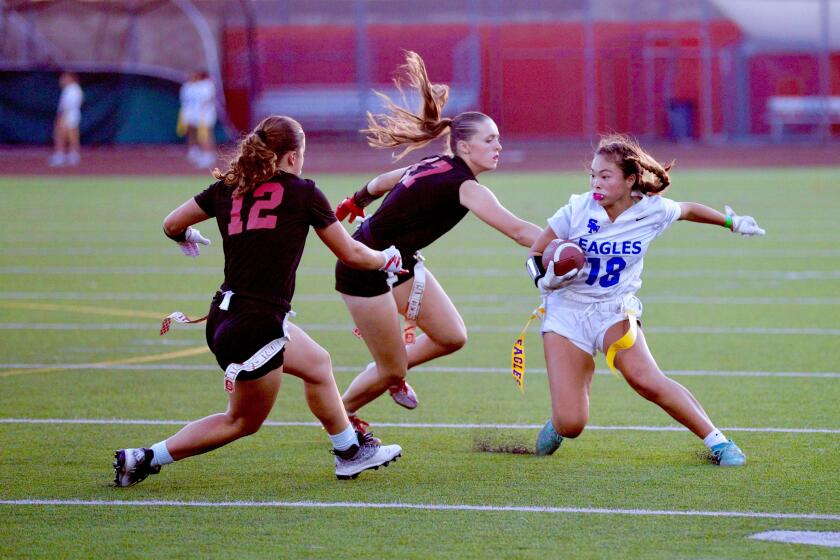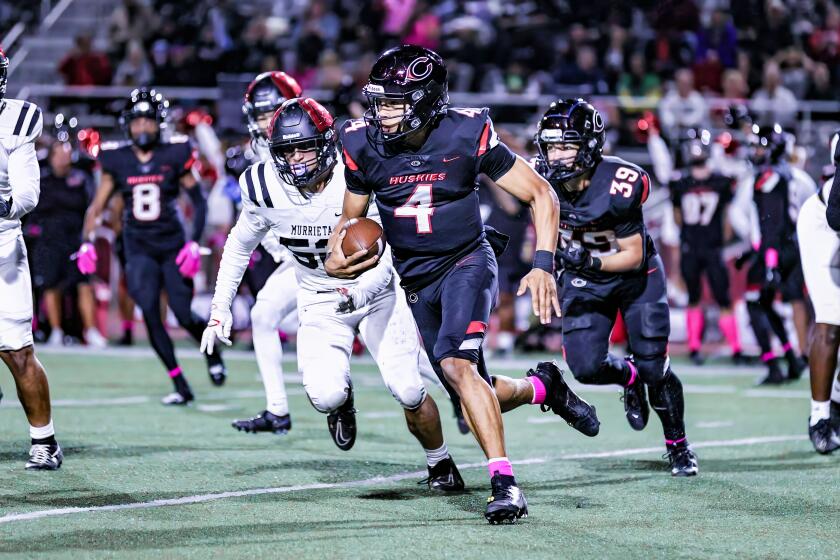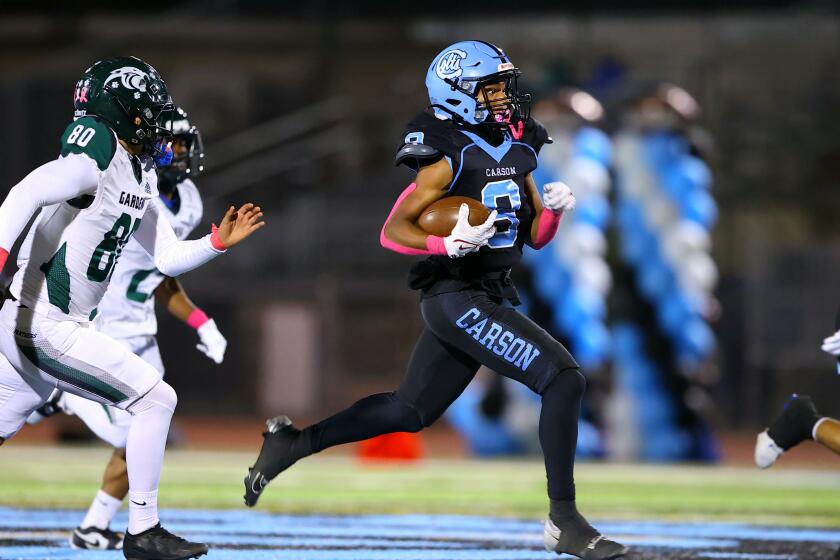Teen Swimmer Cites as Unfair Loss of Grant for Training
Veronica Hernandez figured it was too good to be true.
And she was right.
Hernandez is a 14-year-old swimmer from Sherman Oaks with Olympic dreams. She has the skills and desire to perhaps realize those dreams. But she does not have the resources.
A member of the Glendale YMCA senior swim team, Hernandez started swimming in Junior Olympic competition at age 9 and in national meets at 12. She recently finished eighth in her age group in the 200 butterfly in the Y Short Course nationals and is currently ranked 24th in her age group by US Swimming, the national governing body for the sport.
But Hernandez is one of three children in a single-parent household. Her mother works as a housekeeper, earning $1,200 a month. Money is a problem.
So imagine Hernandez’s joy when she learned that she had been selected as one of 25 athletes in California and Florida to receive a cash grant from the Amateur Athletic Foundation of Los Angeles and Glendale Federal Bank. And imagine her frustration when the grant, $4,000 spread over four years, was snatched away just hours before she was to receive it.
The money was denied to Hernandez and five other athletes when the NCAA ruled that the receipt of such a payment could cost them their college eligibility. All six compete in sports sanctioned by the NCAA at the college level.
Just before Hernandez arrived at the AAF office to receive her award, a message arrived from the NCAA disallowing the grant.
“We did not know there was any problem,” said Betty Freeman, the Sherman Oaks woman for whom Hernandez’s mother worked and who has assumed the financial burden for Hernandez’s athletic career. “The grants were to be based on financial need and given to someone like Veronica who is an exceptional student and swimmer. We were told it was all being worked out with the NCAA.
Freeman said an official with the AAF told her the money might have to be awarded to Hernandez’s swim club instead of to the swimmer directly, but even that approach was eventually rejected.
“They told us when to be there for the presentation. When we got there, they told the people in question to go into a separate room,” Freeman said. “Then they showed us a copy of a letter faxed from the NCAA that stated that payment in any form would jeopardize the athlete’s standing with the NCAA. It was a great disappointment. We feel things should have been worked out before the money was ever offered.”
Hernandez’s language was a little stronger.
“I think it’s kind of stupid,” she said. “I didn’t come there to get an award. I came there to get the money. It’s not right. It means only the rich kids can go to the Olympics. I can’t afford that. The rules ought to be changed. I don’t think it’s fair.”
Neither does Amanda Henry, 18, of Thousand Oaks. A cyclist, she received her grant because she is not involved in an NCAA sport.
“I’m very honored,” Henry said. “The money is going to help a lot. I am going to be doing a lot of traveling to compete that I wouldn’t otherwise be doing.”
But as for what happened to Hernandez and some of the others, “I thought it was pretty low,” Henry said. “It’s really hard for everyone at that level to compete anyway. It’s not like they’re going to take the money and go out and spend it. It’s just enough to keep the competition level high enough to be successful.
“It was a stressful situation to put people in. A lot of them seemed to be in real shock when they found out they weren’t getting the money. Everybody’s hearts went out to them.
“But someone who lost their NCAA eligibility in swimming would really be missing out. A lot of kids are eligible for big athletic scholarships, and that’s their way through college. I’m lucky my sport is not an NCAA sport.”
The sympathy for Hernandez and the five others, including fencer Avi Friedlich, 17, of Encino, extends all the way to the top.
“I’m distressed,” said Anita de Frantz, president of the AAF and a member of the International Olympic Committee. “It would be like a young, musically talented person being told they can’t take any lessons until they get to college. That doesn’t happen. In sports, it does. The purpose of the grant is to train these people and enhance their skills. Why should a young person be denied that opportunity?
“We had been talking with the NCAA for months. We knew it could be a problem, but it was not until the morning of the awards that we got a letter in writing.”
The rules are clear, according to Rick Evrard, director of legislative services for the NCAA.
“NCAA rules state,” Evrard said, “that a student may receive actual and necessary expenses to participate in a sport by the school he or she attends or by the organization sponsoring the competition. That’s all. Compensation in any form is violative of amateur regulations.”
De Frantz hopes that some good may still come of the whole affair.
“This is the best evidence of the problem,” she said. “In my judgment, it’s a case of the NCAA overreaching its authority. You shouldn’t have to be wealthy to compete. These athletes need support now. This has nothing to do with why the NCAA has to regulate collegiate sports.
“The NCAA will be meeting with the U. S. Olympic Committee soon to discuss issues of amateurism. I hope this will be discussed. I hope the corporations also become outraged. What we need is some outrage.”
Evrard, too, saw the need for reform.
“Out of those meetings could come proposed legislation,” he said. “That is a possibility. The only thing we can do is take back a message to the committees that we have a problem out there. It’s an age-old question. How the Olympic movement defines amateurism is not the same as how we define it.”
But while issues are worked over in committee rooms, what of Hernandez and her dreams?
“That money would have meant,” Freeman said, “that we could hire a trainer to work with Veronica at least once a week and help her with all the things that go into making a real champion. It could have helped pay the expenses of traveling to national and international meets.
“It is very difficult for the U. S. to have athletes to represent us in the Olympics or any international competition when some are not able to afford the training it takes. Things like this large corporation wanting to help out are very commendable and, I believe, should be allowed.
“I have taken care of Veronica’s expenses and will continue to do so, but those expenses have gotten high and will get higher. The minimum figure for her expenses over the next four years is $20,000. But Veronica’s real purpose is to get a scholarship to a major university so she can study dentistry. There is no way she can have that college education without a scholarship. And we will do nothing to jeopardize that.
“It would have been easier if they had helped out, but, come hell or high water, I will get Veronica a scholarship to a major college and to the Olympics.”
Hernandez is just as determined.
“I will get the money somehow,” she said. “I don’t know how, but I will keep swimming.”
Get our high school sports newsletter
Prep Rally is devoted to the SoCal high school sports experience, bringing you scores, stories and a behind-the-scenes look at what makes prep sports so popular.
You may occasionally receive promotional content from the Los Angeles Times.



